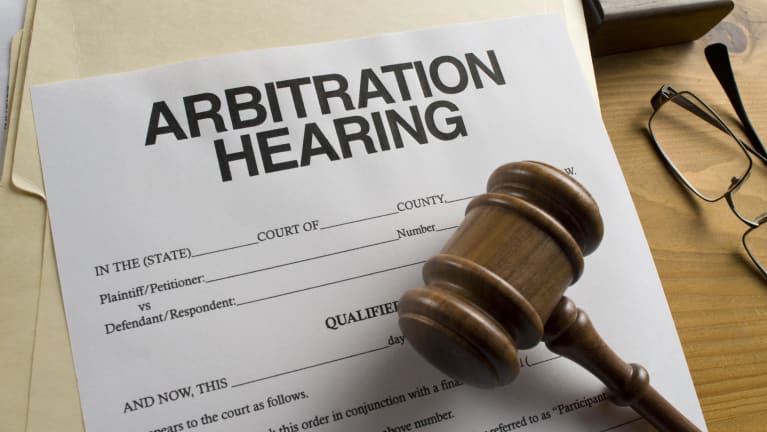
Takeaway: An arbitrator must receive an employer’s payment of required arbitration fees within the statutory deadline, and the proverbial “check in the mail” does not constitute payment.
A jewelry company in California could not compel a former employee’s sexual harassment and sexual assault claims to arbitration where the arbitrator did not receive the employer’s payment of arbitration fees until two days after the statutory deadline had passed, even though a check for payment had been mailed before the due date, a California appeals court recently ruled. The proverbial “check in the mail” does not constitute payment, the court said.
The employee sued her former employer, asserting multiple claims arising from her former manager’s alleged sexual harassment and assault. The employer successfully moved the case to arbitration.
Sept. 1, 2022, was the due date for the employer to pay certain arbitration fees and costs to the arbitrator, as required by California’s Arbitration Act. Under the law, these fees and costs had to be “paid within 30 days after the due date”—or by Oct. 3—to avoid breaching the arbitration agreement. Instead, the arbitrator received the payment on Oct. 5, two days after the statutory 30-day grace period expired. This delay occurred because the employer opted to mail a check on Friday, Sept. 30 for the full amount due on Monday, Oct. 3, even though payment could be submitted by credit card, electronic check or wire transfer.
The employee moved to vacate the order compelling arbitration because the employer failed to pay its arbitration fees and costs within 30 days of the due date as required by the statute. The trial court denied the motion, and the employee sought review in the appellate court.
Appellate Court’s Decision
The appeals court reversed, noting that it would strictly enforce the statutory 30-day grace period and concluding that fees and costs owed for a pending proceeding must be received by the arbitrator within 30 days after the due date. A check in the mail does not constitute payment, the court said, and the employer’s payment, received more than 30 days after the due date, was untimely.
In 1961, the California Legislature enacted the California Arbitration Act (CAA) as a way to protect the right of private parties to resolve their disputes through arbitration, the appeals court noted.
In 2019, the California Legislature amended the CAA, adding Section 1281.98, subdivision (a), which sets forth the procedures for a company’s payment of fees and costs while an arbitration proceeding is pending. Section 1281.98(a)(1) provides that if the fees or costs required to continue an arbitration proceeding are not paid within 30 days after the due date, the employer is in material breach of the arbitration agreement. As a result of this breach, the employee may withdraw the claim from arbitration and proceed in court, the appeals court said.
In this case, Sept. 1 was the due date for the employer’s payment of the arbitration fees and costs. The employer mailed a check to the arbitrator on Sept. 30, and the arbitrator received the payment on Oct. 5.
The court noted that it was therefore required to interpret what “paid within 30 days after the due date” in Section 1281.98 means and would do so according to well-established principles of statutory construction.
“As in any case involving statutory interpretation, our fundamental task here is to determine the Legislature’s intent so as to effectuate the law’s purpose,” the court said. The first step was to examine the statute’s words, giving them a plain and commonsense meaning.
In this case, however, the court said, the statutory language is not clear. There is no definition for the term “paid” in the clause “if the fees or costs required to continue the arbitration proceeding are not paid within 30 days after the due date.”
Absent a statutory definition, courts may turn to dictionaries to look for a word’s usual, ordinary meaning. In this case, that inquiry does not lead to a definitive conclusion, the court continued, as dictionaries provide a number of definitions for “pay.”
The court would therefore turn to the statute’s legislative history to reach an interpretation that best comports with the legislature’s purpose.
While the appeals court identified nothing in the legislative history that addresses whether payment of arbitration costs “within 30 days after the due date” means received or remitted within the 30-day grace period, the legislative purpose in enacting Section 1281.98 is important, the court said.
One of the legislature’s main objectives was to deter employers from strategically withholding payment of arbitration fees. To do this, the legislature established strict breach provisions for nonpayment that did not involve any inquiry into the intent or good faith of an employer or the reasons for nonpayment. Any untimely payment constituted a material breach, regardless of the circumstances or status of the arbitration proceedings.
Here, the construction offered by the employee—that payment must be received within 30 days of the due date—best effectuates this legislative purpose, the court concluded. This construction provides a clear, bright-line rule for determining compliance with the 30-day statutory grace period, as the arbitrator can readily and definitively determine whether funds have been received to satisfy any outstanding fees or costs owed for a pending arbitration.
Doe v. Superior Court of the City and County of San Francisco, Calif. Ct. App., No. A167105 (Sept. 8, 2023).
Joanne Deschenaux, J.D., is a freelance writer in Annapolis, Md.


